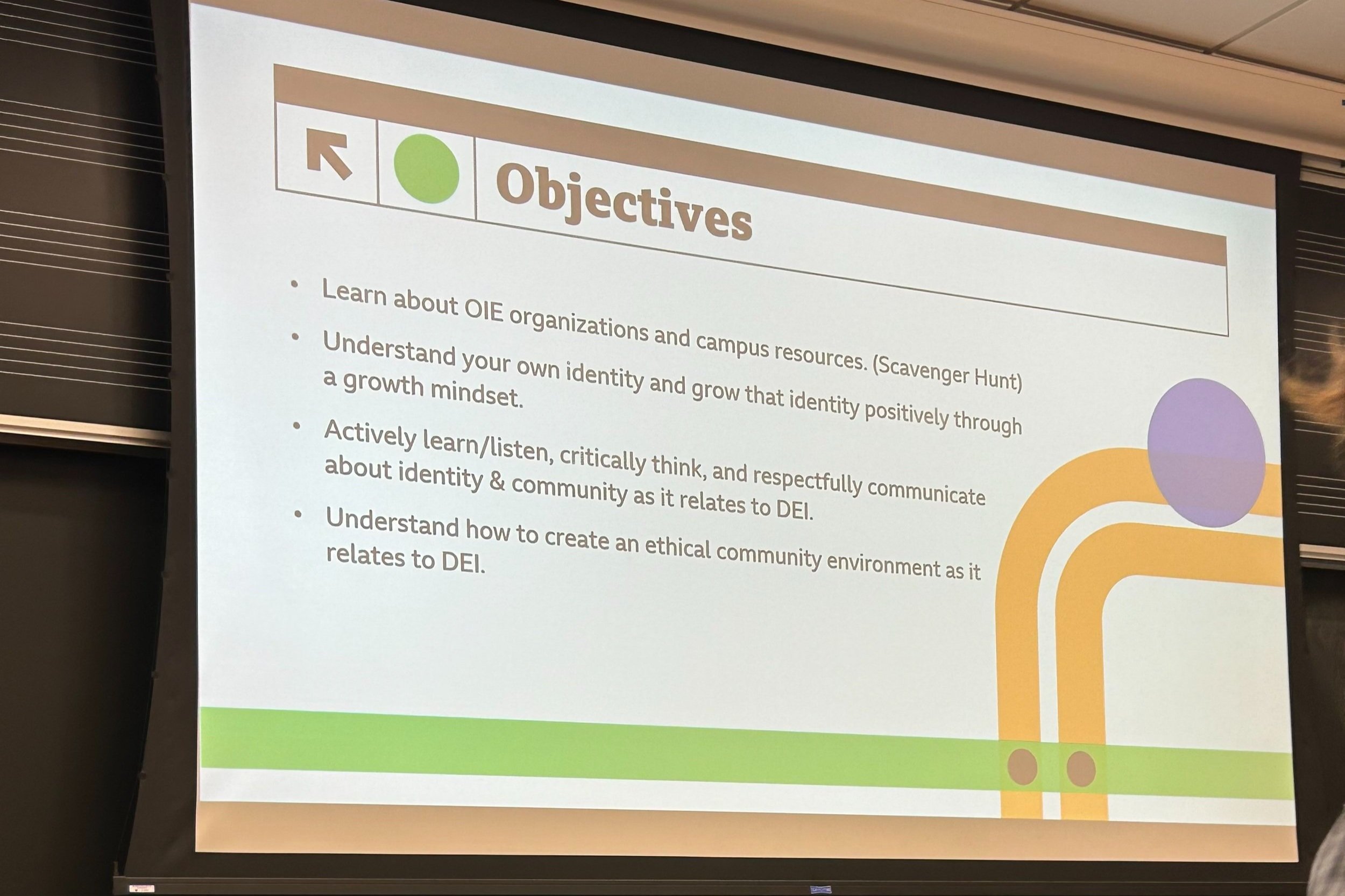Freshmen DEI Training Forces Speech
NEWS | DEI training mandatory for freshmen, conscientious objectors forced to speak
Students learn about privilege, identity, and intersectionality under university duress
(Slide featuring the agenda for the mandatory freshman DEI training on November 5. Source: The Spectator)
On November 5, 2023, the entire freshman class participated in a mandatory training titled “Continuing Education: Diversity, Inclusion and Community.”
University representatives told students that they could under no circumstances miss the session and would be reprimanded if absent. The training was completed in small groups. Each group consisted of a residence hall along with the hall’s Resident Advisor (RA) and Peer Counselors. The session lasted around 2.5 hours.
At one session, the facilitators introduced themselves with their pronouns, per university guidelines. Although “equity” was not used in the title of the presentation, the phrase “DEI” appeared in the accompanying slides, and Kimberlé Crenshaw — a progressive writer who discusses civil rights, critical race theory, Black feminist legal theory, systemic racism, and other topics — was cited in the slideshow’s definition of intersectionality.
Students participated in an “Identity Compass” activity, which involved signs placed around a room, each sign representing aspects of identity such as age, health, nationality, ethnicity, sex, gender, religion, and socioeconomic status.
The facilitator asked questions including “Which part of your identity are you most open to exploring?” or “Which part of your identity gives you the most privilege?” Then, facilitators instructed students to stand by the sign that signified their answers.
When defining identity, the slideshow stated that “all identities are fluid,” whether visible or non-visible. The presentation also discussed “identity salience,” defined as “how prominent an aspect of identity is to you.”
(Slide describing objectives of the mandatory training session. Source: The Spectator)
Presenters defined intersectionality as “the complex of reciprocal attachments and sometimes polarizing conflicts that confront individuals and movements as they seek to ‘navigate’ among the raced, gendered, and class-based dimensions of social and political life.”
Merriam-Webster defines it as “the complex, cumulative way in which the effects of multiple forms of discrimination (such as racism, sexism, and classism) combine, overlap, or intersect especially in the experiences of marginalized individuals or groups.”
The presenters noted that women of color, in particular, manifest intersectionality, as their “layers of oppressed identities … that are not present in white women create a unique perspective on the actions and events surrounding various feminist movements.”
This also applied to LGBTQ individuals: presenters stated that “intersectional invisibility is crucial to LGBTQ individuals.”
The facilitators then moved to discuss more broadly how “an individual’s intersection of historically oppressed identities has the potential to render that individual unacknowledged in both respective communities”, and that “you can be both the oppressor or the oppressed.”
The facilitators defined privilege as “the often unearned access to resources/social power that are only readily available to some people because of their social/identity group membership.”
The section on privilege stated that “privilege is often invisible to those who have it, as they have not necessarily been forced to understand the world through a different lens,” and that privilege is “loaded in some areas, and a borderline trigger for a lot of people.”
(Slide defining privilege from the training session. Source: The Spectator)
They clarified that “the intent of discussing privilege is not to target a specific group based on their perceived privilege but to create space to think about what privileges we all have, and how we can be mindful of where we might have earned [those privileges] and unearned advantages not available to others.”
Presenters asked students to volunteer to read portions of the slides. For one slide, the facilitator forced a student to read after no one had volunteered.
When asked to read, the student replied: “I’d rather not.” The presenter stated, “I’m going to make you.” The student sighed and reluctantly read the slide out loud.
After the seminar concluded, the student was interviewed by The Spectator. He said that he “felt afterwards that the facilitator intruded on my personal opinions and infringed on my right to conscientious objection.”
The student explained further how “Many of my religious viewpoints conflict with the ideologies expressed in the presentation. I felt that the curriculum was engineered to appear as the middle socio-political ground, when in reality it was heavily biased towards the political left. In light of this, it was my intention to listen respectfully but not participate by reciting statements which I didn’t necessarily agree with.”
“When I was asked to read, I said that I would rather not, but the facilitator told me she would make me. I did not want to make a scene or offend anyone and so I conceded and read what I was asked to,” he said.
To conclude, the students discussed ‘lessons learned’ and the contributions that each of them had made to the activity.




